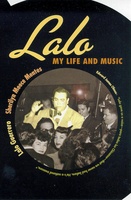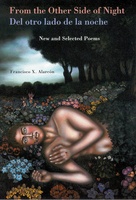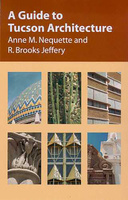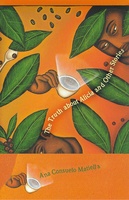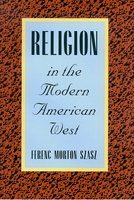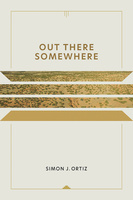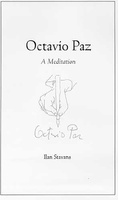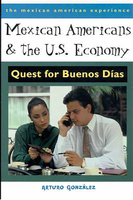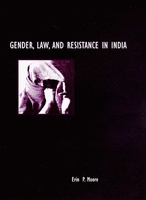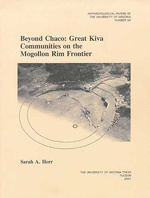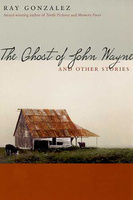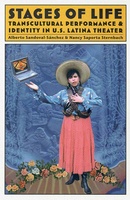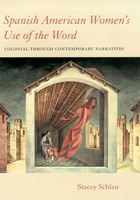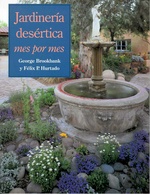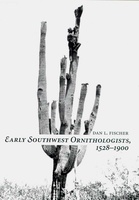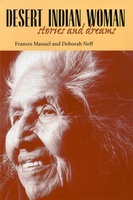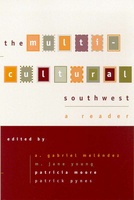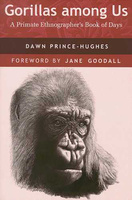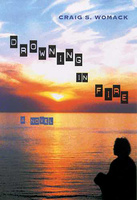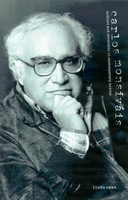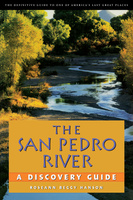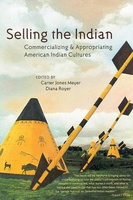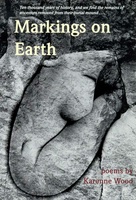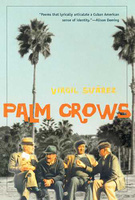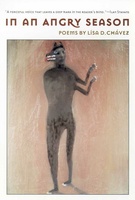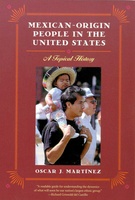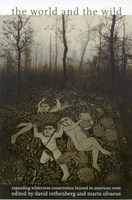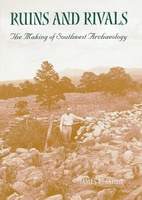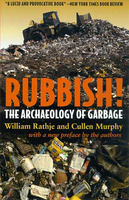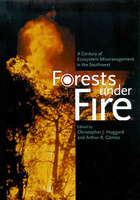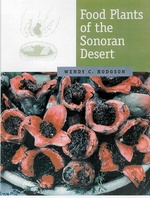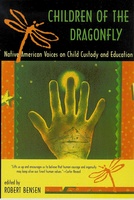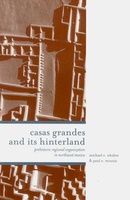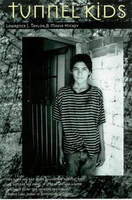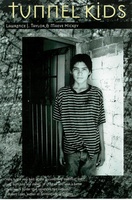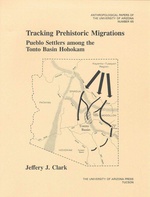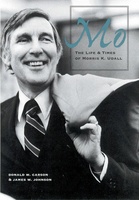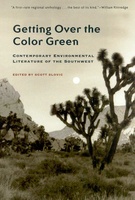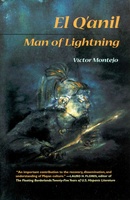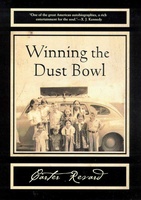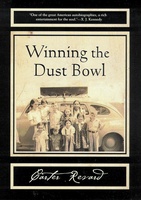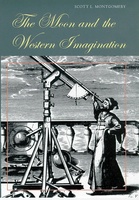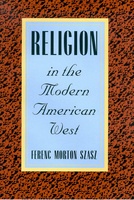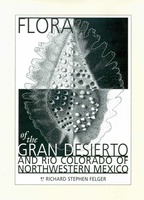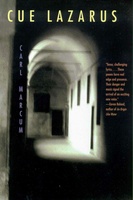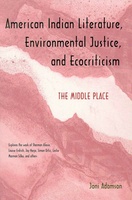Lalo
He has been called "the father of Chicano music" and "the original Chicano hepcat." A modest man in awe of his own celebrity, he has sung of the joys and sorrows, dreams and frustrations of the Mexican American community over a sixty-year career. Lalo Guerrero is an American original, and his music jubilantly reflects the history of Chicano popular culture and music.
Lalo's autobiography takes readers on a musical rollercoaster, from his earliest enjoyment of Latino and black sounds in Tucson to his burgeoning career in Los Angeles singing with Los Carlistas, the quartet with which he began his recording career in 1938. During the fifties and sixties his music dominated the Latin American charts in both North and South America, and his song "Canción Mexicana" has become the unofficial anthem of Mexico.
Through the years, Lalo mastered boleros, rancheras, salsas, mambos, cha-chas, and swing; he performed protest songs, children's music, and corridos that told of his people's struggles. Riding the crest of changing styles, he wrote pachuco boogies in one period and penned clever Spanish parodies of American hit songs in another. For all of these contributions to American music, Lalo was awarded a National Medal of the Arts from President Clinton.
Lalo's story is also the story of his times. We meet his family and earliest musical associatesincluding his long relationship with Manuel Acuña, who first got Lalo into the recording studioand the many performers he counted as friends, from Frank Sinatra to Los Lobos. We relive the spirit of the nightclubs where he was a headliner and the one-night stands he performed all over the Southwest. We also discover what life was like in old Tucson and in mid-century L.A. as seen through the eyes of this uniquely creative artist.
"In 1958," Guerrero recalls, "I wrote a song about a Martian who came to Earth to clear up certain misunderstandings about Mars. Now I have decided that it is time to set some things straight about Lalo Guerrero." Lalo does just that, in an often funny, sometimes sentimental story that traces the musical genius of a man whose talent has taken him all over the world, but who still believes in giving back to the community. His story is a gift to that community.
The book also features a detailed discography, compiled by Lalo's son Mark, tracing his recorded output from the days of 78s to his most recent CDs.
From the Other Side of Night/Del otro lado de la noche
New and Selected Poems
Religion in the Modern American West
Mexican Americans and the U.S. Economy
Quest for Buenos Días
Beyond Chaco
Great Kiva Communities on the Mogollon Rim Frontier
Stages of Life
Transcultural Performance and Identity in U.S. Latina Theater
Spanish American Women's Use of the Word
Colonial through Contemporary Narratives
Jardinería desértica
Mes por mes
Desert Indian Woman
Stories and Dreams
Gorillas among Us
A Primate Ethnographer’s Book of Days
Carlos Monsiváis
Culture and Chronicle in Contemporary Mexico
Selling the Indian
Commercializing and Appropriating American Indian Cultures
Nomads of a Desert City
Personal Stories from Citizens of the Street
Mexican Americans and Health
By the middle of the twenty-first century, one out of every six Americans will be of Mexican descent; and as health care becomes of increasing concern to all Americans, the particular needs of Mexican Americans will have to be more thoroughly addressed.
Mexican Americans and Health explains how the health of Mexican-...
Mexican-Origin People in the United States
A Topical History
The World and the Wild
Expanding Wilderness Conservation Beyond its American Roots
Ruins and Rivals
Published in cooperation with the
William P. Clements Center for Southwest Studies, Southern Methodist University
Ruins are as central to the image of the American Southwest as are its mountains and deserts, and antiquity is a key element of modern southwestern heritage. Yet prior to the mid-nineteenth century this rich legacy was largely unknown to the outside world. While military expeditions first brought word of enigmatic relics to the eastern United States, the new intellectual frontier was seized by archaeologists, who used the results of their southwestern explorations to build a foundation for the scientific study of the American past.
In Ruins and Rivals, James Snead helps us understand the historical development of archaeology in the Southwest from the 1890s to the 1920s and its relationship with the popular conception of the region. He examines two major research traditions: expeditions dispatched from the major eastern museums and those supported by archaeological societies based in the Southwest itself. By comparing the projects of New York's American Museum of Natural History with those of the Southwest Museum in Los Angeles and the Santa Fe-based School of American Archaeology, he illustrates the way that competition for status and prestige shaped the way that archaeological remains were explored and interpreted. The decades-long competition between institutions and their advocates ultimately created an agenda for Southwest archaeology that has survived into modern times.
Snead takes us back to the days when the field was populated by relic hunters and eastern "museum men" who formed uneasy alliances among themselves and with western boosters who used archaeology to advance their own causes. Richard Wetherill, Frederic Ward Putnam, Charles Lummis, and other colorful characters all promoted their own archaeological endeavors before an audience that included wealthy patrons, museum administrators, and other cultural figures. The resulting competition between scholarly and public interests shifted among museum halls, legislative chambers, and the drawing rooms of Victorian America but always returned to the enigmatic ruins of Chaco Canyon, Bandelier, and Mesa Verde.
Ruins and Rivals contains a wealth of anecdotal material that conveys the flavor of digs and discoveries, scholars and scoundrels, tracing the origins of everything from national monuments to "Santa Fe Style." It rekindles the excitement of discovery, illustrating the role that archaeology played in creating the southwestern "past" and how that image of antiquity continues to exert its influence today.
Rubbish!
The Archaeology of Garbage
Forests under Fire
A Century of Ecosystem Mismanagement in the Southwest
Food Plants of the Sonoran Desert
The seemingly inhospitable Sonoran Desert has provided sustenance to indigenous peoples for centuries. Although it is to all appearances a land bereft of useful plants, fully one-fifth of the desert's flora are edible. This volume presents information on nearly 540 edible plants used by people of more than fifty traditional ...
Children of the Dragonfly
Native American Voices on Child Custody and Education
Casas Grandes and Its Hinterlands
Prehistoric Regional Organization in Northwest Mexico
Tunnel Kids
Winner of the Southwest Book Award! Beneath the streets of the U.S.-Mexico border, children are coming of age. They have come from all over Mexico to find shelter and adventure in the drainage tunnels that connect the twin cities of Nogales, Sonora, and Nogales, Arizona. This book opens up the world of the tunnel kids and tells how in this murky underworld of struggling immigrants, drug dealers, and thieves, these kids have carved out a place of their own.
Two parallel tunnels each fourteen feet wide and several miles long drain the summer rains from Mexico to the United States. Here and in the crumbling colonias you'll meet the tunnel kids: streetwise El Boston, a six-year veteran of the tunnels; his little pal Jesús; Jesús' girlfriend, La Flor, and her six-month-old baby; wild Negra; poetic Guanatos; moody Romel and his beautiful girlfriend, La Fanta. They form an extended family of some two dozen young people who live hard-edged lives and answer to no one in El Barrio Libre the free barrio.
Lawrence Taylor and Maeve Hickey met these kids at Mi Nueva Casa, the safe house built to draw the youths out of the tunnels and into a more normal life. The authors spent two summers with tunnel kids as they roamed all over Nogales and beyond in their struggle to survive. In the course of their adventures the kids described their lives, talking about what might tempt them to leave the tunnels and what kept them there.
Hickey's stunning portraits provide a heart-stopping counterpoint to Taylor's incisive prose. Story and photos together open a window into the life of the tunnel kidsa world like that of many homeless children, precarious and adaptive, albeit unique to the border. Where most people might see just another gang of doped-up, violent children, Taylor and Hickey discover displaced and sometimes heroic young people whose stories add a human dimension to the world of the U.S.-Mexico border.
Tracking Prehistoric Migrations
Pueblo Settlers among the Tonto Basin Hohokam
Southwestern Medical Dictionary
Spanish-English, English-Spanish
Mo
Everybody liked Mo. Throughout his political life and especially during his bid for the Democratic presidential nomination in 1976 thousands of people were drawn to Arizona congressman Morris K. Udall by his humor, humanity, and courage. This biography traces the remarkable career of the candidate who was "too funny to be president" and introduces readers to Mo the politician, Mo the environmentalist, and Mo the man.
Journalists Donald Carson and James Johnson interviewed more than one hundred of Udall's associates and family members to create an unusually rich portrait. They recall Udall's Mormon boyhood in Arizona when he lost an eye at age six, his service during World War II, his brief career in professional basketball, and his work as a lawyer and county prosecutor, which earned him a reputation for fairness and openness.
Mo provides the most complete record of Udall's thirty-year congressional career ever published. It reveals how he challenged the House seniority system and turned the House Interior Committee into a powerful panel that did as much to protect the environment as any organization in the twentieth century. It shows Udall to have been a consensus builder for environmental issues who paved the way for the Alaska Lands Act of 1980, helped set aside 2.4 million acres of wilderness in Arizona, and fought for the Central Arizona Project, one of the most ambitious water projects in U.S. history.
Carson and Johnson record Udall's early opposition to the Vietnam War at a time when that conflict was largely perceived as a just cause, as well as his early advocacy of campaign finance reform. They also provide a behind-the-scenes account of his run for the presidency the first House member to seek the office in nearly a century which gained him an intensely loyal national following.
Mo explores the paradoxes that beset Udall: He was a man able to accomplish things politically because people genuinely liked and respected him, yet he was a loner and workaholic whose focus on politics overshadowed his personal life. Carson and Johnson devote a chapter to the famous Udall sense of humor. They also look sensitively at his role as a husband and father and at his proud and stubborn bout with Parkinson's disease.
Mo Udall will long be remembered for his contributions to environmental legislation, for his unflagging efforts in behalf of Arizona, and for the gentle humor with which he conducted his life. This book secures his legacy.
Getting Over the Color Green
Contemporary Environmental Literature of the Southwest
Winning the Dust Bowl
Bootleggers and bankrobbers in the Oklahoma Dust Bowl. Proctors and punters at Oxford. Activists and agitators of the American Indian Movement. Carter Revard has known them all, and in this book a memoir in prose and poetry he interweaves the many threads of his life as only a gifted writer can.
Winning the Dust Bowl traces Revard's development from a poor Oklahoma farm boy during the depths of the Depression to a respected medieval scholar and outstanding Native American poet. It recounts his search for a personal and poetic voice, his struggle to keep and expand it, and his attempt to find ways of reconciling the disparate influences of his life.
In these pages, readers will find poems both new and familiar: poems of family and home, of loss and survival. In linking what he calls "cocooning" essays, Revard shares what he has noticed about how poems come into being, how changes in style arise from changes in life, and how language can be used to deal with one's relationship to the world. He also includes stories of Poncas and Osages, powwow stories and Oxford fables, and a gallery of photographs that capture images of his past.
Revard has crafted a book about poetry and authorship, about American history and culture. Lyrical in one breath and stingingly political in the next, he calls on his mastery of language to show us the undying connection between literature and life.

